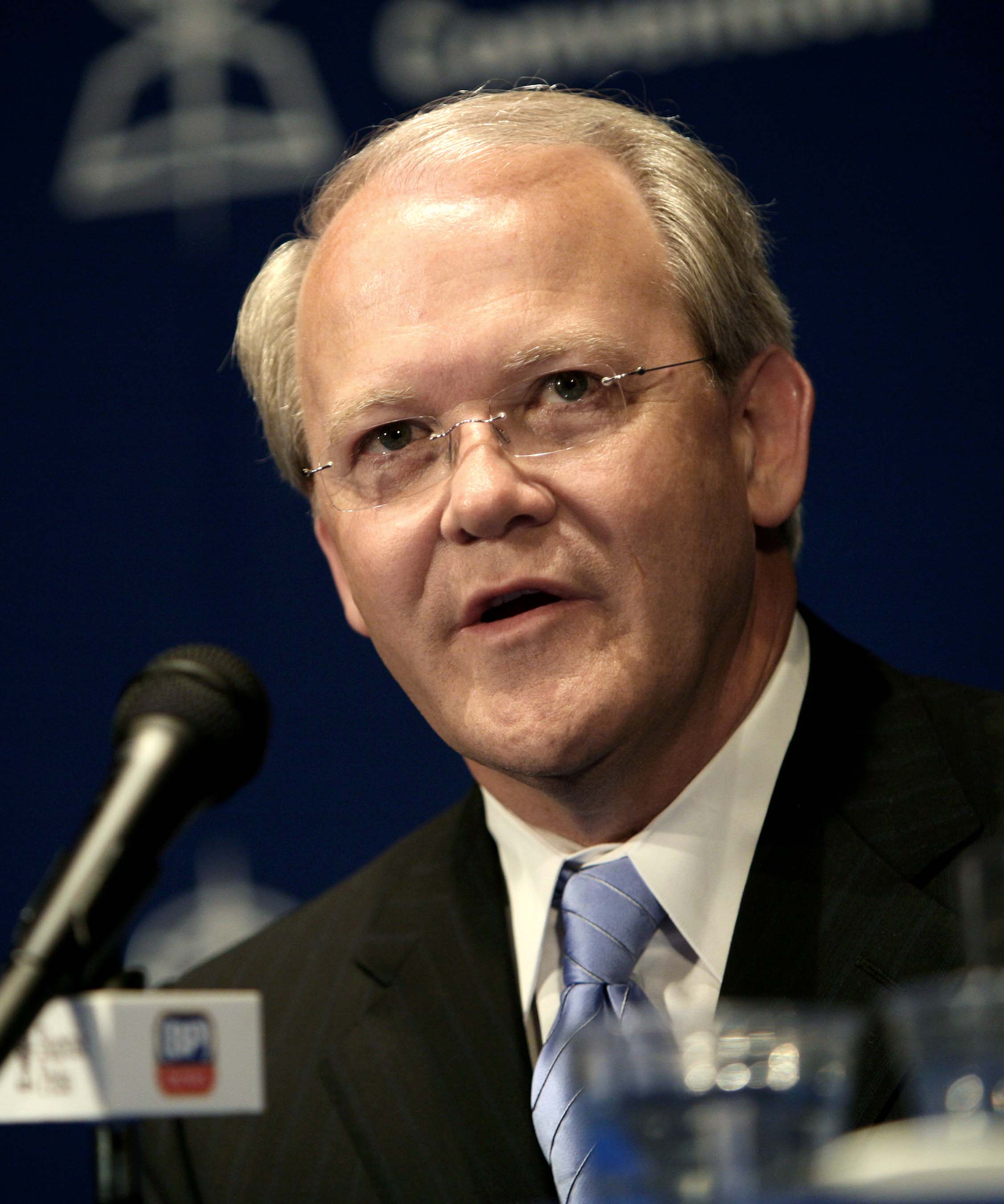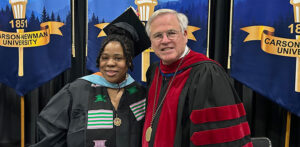
TAYLORS, S.C. (BP)—In 1980, Frank Page completed a doctor of philosophy degree in Christian ethics at Southwestern Baptist Theological Seminary with the acceptance of his dissertation, “Toward a Biblical Ethic of Women in Ministry,” which strongly advocated unlimited roles for women in ministry, including serving as church pastors.
In an extensive interview with the Florida Baptist Witness, Page said he recanted those admittedly “radical” and “extreme” views shortly after earning the Ph.D. and he has repeatedly asserted his support of the Baptist Faith and Message statement concerning the matter.
Page, pastor of First Baptist Church in Taylors, S.C., who was elected as president of the Southern Baptist Convention in June, spoke at length in the interview about his views on women in ministry, concerns about narrowing boundaries of theological cooperation, an SBC resolution calling for abstinence from alcohol and the debate on Calvinism.
WOMEN IN MINISTRY
Although surprised that his doctoral dissertation did not become a point of debate and controversy in the SBC presidential election, Page said he wonders whether the issue is being raised following his election “to make sure I’m discredited to the point that another candidate would be elected in 2007 in San Antonio,” the location for the Southern Baptist Convention annual meeting.
“There are many people who would love to jump on [the dissertation] and say, ‘See, we told you he was a moderate,’” Page said.
Still, he concedes the dissertation is “fair game” and the questions are appropriate “because it’s a legitimate part of who I was” -— past tense, Page emphasized frequently when discussing his views on women in ministry.
“Is it embarrassing to me that at one time I held such extreme views? Yes, it is. But it would also be equally hurtful to me to seem like in subsequent discussions, such as this one, to think that women are somehow secondary in God’s Kingdom. I would hate for them to think that,” Page said.
Since the interview with the Witness on July 12, Page’s dissertation views have surfaced in public discussion as a result of a news story on a liberal Baptist website, EthicsDaily.com, and in various weblogs -— a development Page anticipated.
Page compared his change in views on the subject of women in ministry to a similar reversal by R. Albert Mohler Jr., president of Southern Baptist Theological Seminary, and a prominent conservative leader in the SBC today.
“Al Mohler and I are in the same boat in this particular issue -— both [of us] tried to push what we had been taught into a biblically acceptable format. Both miserably failed. And both have since recanted from that,” Page said.
As a seminary doctoral student who was committed to the truth of Scripture —- inerrancy before the subject had become a central issue in the SBC conservative resurgence -— Page said, “I was trying very hard to conform biblical passages to some cultural preferences of the time.” Shortly after receiving the Ph.D., however, Page became convinced “through personal study and prayer” that his dissertation was not exegetically sound and reflected the work of an “immature theologian.”
As a result, “I changed and recanted those rather extreme views” and he has never advocated women as pastors or even deacons in any of his pastorates during more than 30 years in ministry, nor does he support the ordination of women.
In his dissertation, Page wrote, “There are solid biblical bases for a full recognition of the freedom and responsibility of women in ministry and the freedom of God’s Spirit to bestow the gifts for ministry upon men and women alike. The time has come to declare that since the public activity of a woman is in most areas no longer considered as a breach of the marriage vow and since the law of the land no longer denies to women the right to act independently in mixed gatherings, qualified women are eligible candidates for any office in the church.”
The Baptist Faith and Message, which Page affirms, asserts, “While both men and women are gifted for service in the church, the office of pastor is limited to men as qualified by Scripture.”
“I do very much hold to the belief that God does gift women for ministry, but my belief is very consistent with the Baptist Faith and Message 2000, that while women are indeed gifted by God in a variety of roles and ministries, the role of pastor is held only for the male,” Page told the Witness.
Page said that he believes only men can be pastors because “it’s an authority issue. To have women serving as pastor would be to put that woman in spiritual authority over men and I think Scripture clearly prohibits that.”
In the current debate on women in ministry, Page said he would position himself with the complementarian, rather than egalitarian position.
“I have not used those words because they vary in how they are defined. But if one were to push for me to fall into one of those camps, it would be more in the complementarian style, absolutely,” Page said.
THEOLOGICAL BOUNDARIES
Page was reluctant to speak about the specifics of the debate that has arisen in the last year within the International Mission Board trustees regarding a new baptism guideline and a policy forbidding the acceptance of missionary candidates who practice a “private prayer language.”
“I don’t know the specifics of what happened in those meetings,” Page said of the IMB trustees’ deliberations.
Still, Page did acknowledge he is concerned “the policies have gone a little farther than we should go,” specifically citing the one on private prayer language.
While affirming it is the responsibility of the trustees to set IMB policies and “I respect the trustee system and I don’t have to agree with everything,” Page added: “I just think in that one area there is a possible interpretation of a private prayer language [in Scripture] that we need to be very careful about saying, no. If there is some scriptural possibility there, [a policy forbidding it for missionaries] makes me nervous.”
Page cited 1 Corinthians 14 as a passage which may be interpreted to permit a private prayer language, while noting that he does not personally have a private prayer language.
Page said that it is proper for the IMB to set theological policies which are not explicitly addressed in the Baptist Faith and Message. “There are a multitude of issues that have to be dealt with within the trustee framework that go way beyond the Baptist Faith and Message. … There are many things that the Baptist Faith and Message just simply doesn’t deal with.”
One example that Page agreed the Baptist Faith and Message does not address, but that the IMB properly can address in its policies, involves the charismatic practice of speaking in tongues in public worship.
“I believe there should be serious criteria that would exclude persons from service in that regard,” Page said of those who advocate and practice tongues.
As to the IMB’s baptism guideline, while Page said he was not familiar with the details, he affirmed that he believes re-baptism is necessary in the case of a person who was baptized by immersion following salvation in a church with “incorrect theology,” including one which rejected eternal security of the believer -— which is the requirement of the IMB baptism guideline.
“There would be others in my mind where I have asked over the years for a person who has been baptized by immersion to be re-baptized in our church,” Page said.
Page said there is a “perception” that the IMB policies have “gone too far. We just need to be careful in our trustees that we hold to guidelines that are explicitly biblical and do not go beyond that,” he clarified.
ALCOHOL USE
As a member of the SBC Resolutions Committee this year that recommended the much-discussed resolution calling for “total abstinence” from alcohol for Christians, Page told the Witness he found the debate about the resolution, during the SBC and since, “deeply disturbing,” “eye-opening” and “very troubling.”
The Resolutions Committee put forward the resolution, Page said, because “there was a growing movement among some brethren to promote what we believed was a misinterpretation of the doctrine of freedom in Christ. … When a precious doctrine is being misinterpreted by people within our own convention, the committee, with my certain agreement believed it was necessary to make this kind of stand.”
Page emphatically rejected criticism of the resolution as “pharisaical” and strongly disagreed with the suggestion that the committee was manipulated by outsiders to bring the resolution to the floor.
“I absolutely reject that,” Page said, noting that the members were very “strong,” there was “no strong-arming, there was no pushing” and committee chairman Tommy French, a Louisiana pastor, was a “consummate gentleman.”
Even though he was a member of the committee that recommended the resolution, Page said some unnamed persons are suggesting he is “soft on alcohol” because some of the most prominent critics of the resolution were among the most prominent supporters of his presidential candidacy.
“I would never be judgmental and pharisaical and say you can’t be a Christian and drink a glass of wine. But I have to say as God wants us to be a strong witness that I believe it is extremely important that we stay away from alcohol. To me, the witness issue is the bottom line of why we need to strongly take a stand against alcohol without being pharisaical,” Page said.
CALVINISM
Page said the current debate among Southern Baptists on the issue of Calvinism “has both healthy and negative aspects to it.”
An example of the healthy aspect, he said, was the discussion between Southwestern Baptist Theological Seminary President Paige Patterson —- an opponent of Calvinism -— and Southern Seminary President Mohler —- an advocate of Calvinism -— in two heavily attended workshops of the Pastors’ Conference prior to the SBC annual meeting in Greensboro, N.C.
“I thought the dialogue was an encouraging display of theological debate,” Page said of the Patterson/Mohler dialogue, adding that the SBC needs more of that kind of theological discussion. “It’s [already] being discussed; why not discuss it in a proper forum? I felt it was very good,” Page said.
Some of the negative aspects of the Calvinism debate, Page said, is that the issue contributes to the growing factionalism in SBC life.
“There are some who are drawing lines in the sand and saying you cannot be a Southern Baptist and be a Calvinist. There are Calvinists who are saying we will not rest until every Southern Baptist seminary is five-point Calvinist and all the graduates are five-point Calvinists. So, you’ve got extreme division occurring,” he said.
Asserting his belief that some Southern Baptist seminaries are graduating “hundreds” of students who espouse Calvinism while there are a “relative small number” of Calvinist SBC churches, Page said that he believes Southern Baptists are headed for “tumultuous days” as those graduates come to places of service in the churches.
Page published in 2000 a book, “Trouble with Tulip: A Closer Examination of the Five Points of Calvinism,” critiquing Calvinism which he rejects as based on “manmade” doctrine of Reformation theologian John Calvin, rather than a Bible-based theology. Page also warns that affirmation of Calvinism in churches and denominations leads “inevitably” to diminishing commitment to evangelism.
Page told the Witness that in both of his criticisms of Calvinism -— as manmade and a deterrent to evangelism -— it’s not accurate to say such is true of all advocates of Calvinism, which is why he is willing to work with such Calvinists in SBC life and is willing to appoint such persons to positions of leadership in SBC life.
–30–
James A. Smith Sr. is executive editor of the Florida Baptist Witness, on the Web at https://www.floridabaptistwitness.com.
















